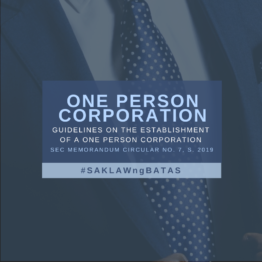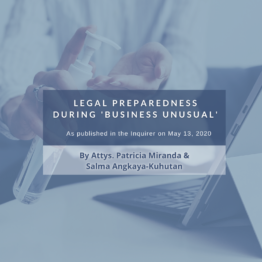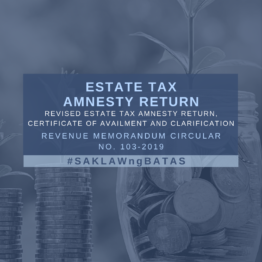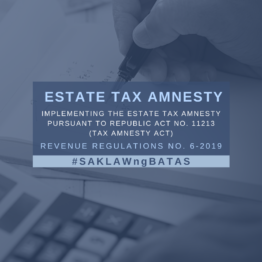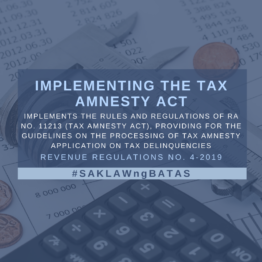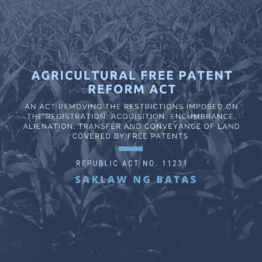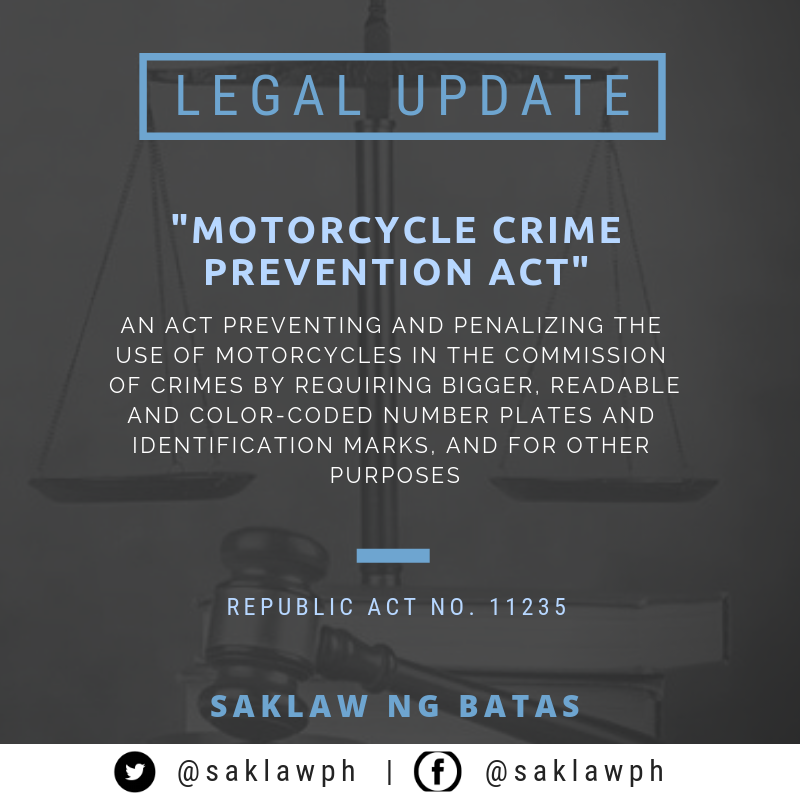
RA 11235
March 8, 2019
REPUBLIC ACT NO. 11235
AN ACT PREVENTING AND PENALIZING THE USE OF MOTORCYCLES IN THE COMMISSION OF CRIMES BY REQUIRING BIGGER, READABLE AND COLOR-CODED NUMBER PLATES AND IDENTIFICATION MARKS, AND FOR OTHER PURPOSES
SECTION 1. Short Title.— This Act shall be known as the “Motorcycle Crime Prevention Act.”
SECTION 2. Declaration of Policy. — Article II, Section 5 of the 1987 Philippine Constitution provides that the maintenance of peace and order, the protection of life, liberty, and property, and the promotion of the general welfare are essential for the enjoyment by all the people of the blessings of democracy. It is hereby declared the policy of the State to secure and safeguard its citizenry from crimes committed with the use of motorcycles through bigger, readable and color-coded number plates and identification marks.
SECTION 3. Definitions.— As used in this Act, the following terms are defined:
(a) Backrider refers to any person or persons seated at the back of a motorcycle, or a passenger of a motorcycle;
(b) Driver refers to any person driving or controlling a motorcycle;
(c) Motorcycle refers to a powered two (2) or three (3)-wheeled motor vehicle, including, but not limited to, scooters, mopeds, and motorcycles with appendages such as sidecars, tricycles, or trikes. This shall include government-owned vehicles;
(d) Owner refers to any person who owns or is the registered owner of a motorcycle. Under this Act, it also refers to any person who has actual control and possession of a motorcycle, whether it is registered or not; and
(e) Number plate refers to the regular motor vehicle license plate issued by the Land Transportation Office (LTO) for a motorcycle, bearing the standard alphanumeric characters in accordance with Republic Act No. 4136, as amended, otherwise known as the “Land Transportation and Traffic Code.”
SECTION 4. Registration by the Owner.— The owner of a motorcycle shall register his or her motorcycle with the LTO within five (5) days from such acquisition of ownership. The owner of a motorcycle shall also immediately report any sale or disposition of his or her motorcycle to the LTO. Failure of the owner to register within five (5) days from acquisition of ownership, or to immediately report its sale or disposition, shall subject the owner to a penalty of imprisonment of arresto mayor to prision correccional, as defined under the Revised Penal Code, or a fine of not less than Twenty thousand pesos (P20,000.00) but not more than Fifty thousand pesos (P50,000.00), or both.
If a motorcycle that is not yet registered with the LTO is used in connection with an offense punishable under the Revised Penal Code or special penal laws, the maximum penalty of the relevant offense shall be imposed on the offenders.
SECTION 5. Bigger, Readable and Color-Coded Number Plates.— The LTO shall issue a readable number plate for every motorcycle. The LTO shall, in the implementing rules and regulations (IRR) of this Act, determine the font style and size of the bigger, readable and color-coded number plates: Provided,That the contents of the number plates shall be readable from the front, the back, and the side of the motorcycle from a distance of at least fifteen (15) meters from the motorcycle.
The LTO shall also devise a color scheme of the readable number plates for every region in the Philippines where a motorcycle is registered for quick and easy identification.
The readable number plates must be displayed in both the front and back sides of a motorcycle and shall be made of suitable and durable material as determined by the LTO.
The utilization of voluntary and paid labor from prisoners shall be among the requirements to bid for the procurement of the number plates under this Act.
SECTION 6. Registry of Motorcycles. — The LTO shall maintain a registry of motorcycles in a database to facilitate information retrieval for official investigation and law enforcement purposes. The registry of motorcycles shall include, but not limited to, the following information: name of motorcycle owner, motorcycle owner’s driver’s license number, motorcycle owner’s address and contact details, motorcycle identification number, motorcycle plate number, motorcycle body color, motorcycle brand/make. In the registry of motorcycles, the LTO shall observe at all times Republic Act No. 10173 or the “Data Privacy Act of 2012.”
SECTION 7. Driving Without a Number Plate or Readable Number Plate.— Driving without a number plate or a readable number plate, as provided in this Act, is prohibited. The driver of a motorcycle without a number plate or readable number plate, as provided in this Act, shall be punished by prision correccional as provided in the Revised Penal Code, or a fine of not less than Fifty thousand pesos (P50,000.00) but not more than One hundred thousand pesos (P100,000.00), or both.
A motorcycle driven without a number plate or a readable number plate shall be stopped, and such motorcycle shall be seized by law enforcers and immediately surrendered to the Philippine National Police (PNP).Any apprehension must be reported immediately to the LTO, PNP and the Department of Information and Communications Technology (DICT) through the Joint LTO and PNP Operations and Control Center. The owner of such motorcycle may redeem his or her seized motorcycle from the LTO upon proof of ownership, payment of the costs of seizure, and compliance with a number plate or readable number plate.
SECTION 8. Failure to Surrender Seized Motorcycle.— Any seized motorcycle must be reported immediately by the apprehending officer to the LTO and PNP through the Joint LTO and PNP Operations and Control Center and must be surrendered within twenty-four (24) hours to the local impounding center provided by the local government unit (LGU).Any law enforcer who shall fail to report or surrender a seized motorcycle, within twenty-four (24) hours from seizure, shall be punished by prision correccional as defined under the Revised Penal Code without prejudice to the filing of proper administrative charges against said officer.
In cases wherein there is loss of, or damage to, the motorcycle in the custody of the said officer in violation of this section, the said law enforcement officer shall also be held monetarily liable for the full worth of the motorcycle lost or the cost of repairs for the damage caused to the motorcycle in question.
Furthermore, any LTO officer, PNP officer or any deputized law enforcement personnel shall be held criminally, administratively and monetarily liable for using an impounded vehicle.
SECTION 9. Use of a Motorcycle in the Commission of a Crime. — If a motorcycle is used in the commission of a crime constituting a grave felony under the Revised Penal Code, or in the escape from the scene of such crime, regardless of the stage of commission, whether attempted, frustrated, or consummated, the owner, driver, backrider or passenger who participated in the same shall be punished by reclusion temporal to reclusion perpetua as provided under the Revised Penal Code.
If a motorcycle is used in the commission of a crime constituting a less grave felony or light felony under the Revised Penal Code or any other crime, or in the escape from the scene of such crime, regardless of the stage of commission whether attempted, frustrated, or consummated, the owner, driver, backrider or passenger who participated in the same shall be punished by prision correccional to prision mayor, as provided under the Revised Penal Code.
If a seized motorcycle is used in the commission of a crime, the maximum penalty of the relevant crime or offense shall be imposed.
If death or serious physical injuries, as defined under the Revised Penal Code, results from the unlawful use of a motorcycle in the commission of a crime, the penalty ofreclusion perpetua as provided under the Revised Penal Code shall be imposed.
SECTION 10. Impoundment and Forfeiture of a Motorcycle.— A motorcycle used in the commission of a crime or offense shall be impounded by the PNP as evidence incustodia legis in a secured impounding center provided by the LGU until the termination of the case. Such motorcycle shall then be forfeited in favor of the government, unless the court finds that the defendant is not guilty of the offense charged or such motorcycle belongs to an innocent third party.
The Department of the Interior and Local Government (DILG) shall ensure and enforce that all LGUs set aside land and establish a secured impounding center that shall be under the control of the PNP to store the impounded motorcycles in accordance with this Act. They shall also have a computerized/digitized data to see to it that all impounded or released motorcycles are duly recorded and such data shall be shared on a real-time basis to the Joint PNP and LTO Operations and Control Center.
SECTION 11. Loss of Number Plate or Readable Number Plate.— If the number plate or readable number plate of a motorcycle is lost, damaged, or stolen, the owner of such motorcycle shall immediately report the same to the LTO and the PNP through the Joint PNP and LTO Operations and Control Center, and request a replacement number plate. Failure of the owner to report the same shall subject the owner to a fine of not less than Twenty thousand pesos (P20,000.00) but not more than Fifty thousand pesos (P50,000.00).
However, if the lost, damaged, or stolen number plate or readable number plate is used in connection with an offense penalized under the Revised Penal Code or special penal laws, the failure of the owner to report within three (3) days that the motorcycle is lost, damaged, or stolen, shall subject the owner to a penalty of imprisonment of arrests mayor to prision correccional.
SECTION 12. Erasing, Tampering, Forging, Imitating, Covering or Concealing a Number Plate or Readable Number Plate and Intentional Use Thereof.— Erasing, tampering, altering, forging, imitating, covering, concealing a number plate or readable number plate, or the intentional use of such erased, tampered, altered, forged, imitated, covered or concealed number plate or readable number plate, under this Act shall be punished by prision mayor as provided under the Revised Penal Code, or a fine of not less than Fifty thousand pesos (P50,000.00) but not more than One hundred thousand pesos (P100,000.00), or both.
If a person knowingly sells or buys an erased, tampered, altered, forged or imitated number plate or readable number plate, both such buyer and seller shall be punished byprision mayor as provided under the Revised Penal Code. However, if the person who sells or buys the number plate proves that he or she has no knowledge that it was erased, tampered, altered, forged or imitated, he or she shall be punished by arresto mayor.
SECTION 13. Use of a Stolen Number Plate or Readable Number Plate.— The use of a stolen number plate or readable number plate in a motorcycle shall be punished byprision mayor as provided under the Revised Penal Code, or a fine of not less than Fifty thousand pesos (P50,000.00) but not more than One hundred thousand pesos (P100,000.00), or both at the discretion of the court.
SECTION 14. Prohibition on Sale and Importation of Non-Compliant Motorcycles.— No person, whether natural or juridical, shall be allowed to sell motorcycles, as defined under Section 3 (c) of this Act, unless such motorcycle has the capability to bear and showcase a readable number plate as required under Section 5 of this Act.
Furthermore, the Bureau of Customs (BOC) shall not allow the importation into the country of motorcycles, as defined under Section 3 (c) of this Act, whose design will impede the placement of the required number plate on the front and back sides of the motorcycles firmly and securely.
Any motorcycle which does not have any capability to bear and showcase the required readable number plate shall not be allowed to be registered with the LTO.
SECTION 15. Joint LTO and PNP Operations and Control Center.— The LTO and the PNP shall establish a Joint LTO and PNP Operations and Control Center that shall be operational and accessible real-time, twenty-four (24) hours a day and seven (7) days a week, to facilitate the implementation of this Act. It shall be equipped with the latest available technology and adequate computers and software sufficient to immediately address any emergency or inquiry. The LTO and the PNP-Highway Patrol Group (HPG) shall establish a hotline to specifically address concerns related to crimes or offenses committed with the use of motorcycles. The Joint PNP and LTO Operations and Control Center shall be under the supervision of the DICT.
SECTION 16. Appropriation.— There is hereby appropriated an initial funding of One hundred fifty million pesos (P150,000,000.00) for the implementation of this Act which shall be included in the General Appropriations Act (GAA).Subsequent funding shall be included in the GAA.
SECTION 17. Implementing Rules and Regulations.— The LTO, in consultation with law enforcement and other relevant agencies, shall promulgate the rules and regulations to implement the provisions of this Act within a non-extendible period of ninety (90) days from its effectivity.
SECTION 18. Congressional Oversight on the Motorcycle Crime Prevention Act.— There is hereby created a Congressional Oversight Committee on the Motorcycle Crime Prevention Act to review and assess, among others, the implementation of this Act. The Congressional Oversight Committee shall be composed of five (5) members from the Senate and five (5) members from the House of Representatives. It shall be co-chaired by the Chairpersons of the Senate Committee on Justice and House Committee on Transportation. Such congressional review and oversight shall be undertaken yearly beginning one (1) year after the effectivity of this Act and thereafter as may be determined by the Oversight Committee.
The Oversight Committee shall review the penalties herein imposed and shall adjust the same accordingly if deemed necessary.
SECTION 19. Transitory Provision.— Motorcycle owners with number plates not in conformity with the provisions of this Act, shall renew their registration and apply for the required readable number plate not later than June 30, 2019. The LTO is given until December 31, 2019 to produce, release and issue the number plates as required by this Act. After December 31, 2019, the penal provisions regarding the use of bigger, readable and color-coded number plates as required under this Act shall take effect.
SECTION 20. Repealing Clause.— All laws, decrees, orders, rules and regulations or other issuances or parts thereof inconsistent with the provisions of this Act are hereby repealed or modified accordingly.
SECTION 21. Separability Clause.— If any portion or provision of this Act is declared unconstitutional, the remainder of this Act or any provision not affected thereby shall remain in force and in effect.
SECTION 22. Effectivity.— This Act shall take effect after fifteen (15) days following the completion of its publication either in the Official Gazette or in a newspaper of general circulation in the Philippines. TIADCc
Approved: March 8, 2019.
https://www.officialgazette.gov.ph/2019/03/08/republic-act-no-11235/


